
Booze, Sailors & Health Menu: 1 2 3 4 5 6 7 8 9 10 11 12 13 14 15 16 17 18 19 Next>>
Booze, Sailors, Pirates and Health In the Golden Age of Piracy, Page 14
Alcohol and Sailors: Celebrations
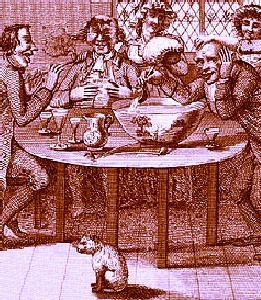
Artist: Samuel Collins
Celebrating with Punch, "Christmas in the Country" (1791)
Alcohol was often an important part of celebrations shipboard and the beverage of choice was punch. As David Wondrich points out, "the true beauty of Punch... [is that it] makes itself the catalyst for, and focus of, a
temporary community of drinkers, not unlike the one you'll find on a good night at a really good neighborhood pub."2 Or on a ship during a festive day. Punch glasses could then be repeatedly filled through the course of the evening from the "flowing bowl", a term first mentioned in print by Matthew Prior in 17181, which indicated that the punch bowl should be continuously refilled during the course of a punch-drinking session to give a ceremonious, ever-flowing supply.
Several of the sailor's accounts during the golden age of piracy testify to the ubiquity of punch at celebrations. Woodes Rogers mentions a couple holidays where punch was an honored guest, beginning with the first holiday of every year. On New Year's day, "every Officer was wish'd a merry New-Year by our Musick, and I had a large Tub of Punch hot upon the Quarter-Deck, where every Man in the Ship had above a Pint to his share, and drank our Owners and Friends Healths in Great Britain, to a happy new Year, a good Voyage, and a safe Return."3
On Valentines day, Rogers again hauled out the punch bowl "in Commemoration of the antient Custom in England of chusing Valentines, I drew up a List of the fair Ladies in Bristol, that were any ways related to or concern'd in the Ships, and sent for my Officers into the Cabbin, where every one drew, and drank the Lady's Health in a Cup of Punch, and to a happy Sight of 'em all"4.
Punch and other alcohols were staples for celebrations, particularly amongst the officers aboard Chaplain Henry Teonge's ships. Teonge kept a detailed diary of what was ate and drank during his voyages aboard the HMS Assistance in 1675-6 and the HMS Bristol in 1678-9. Being a chaplain, he also recorded many of the holidays, even minor ones, with notes on the beverages consumed. Among the holiday-alcohol pairings 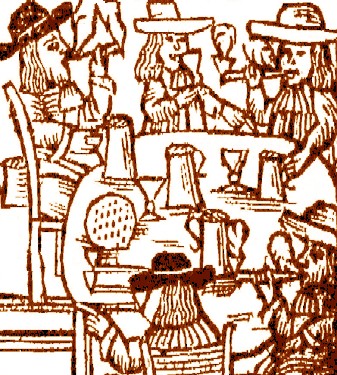
Smoking and Drinking Men (17th Century)
he mentions: various celebrations of King Charles II's birthday and Restoration day: "luke-sherry"5, "wines galore"6 & "good Marget ale, March beere, and last of all, a good boule of punch"7; a man's birthday (kept 'full merrily', alcohol not specified)8; Teonge's wedding anniversary (kept "in the same manner", alcohol not specified)9; Samhain (November 1st, which Teonge calls "Chrismas"): punch10; Christmas (which Teonge calls "Martinmas"): "wine and punch gallore"11; and, naturally, New Years Eve: "wee end the old yeare merily in wine, punch, and brandee"12.
A couple of shipboard events also counted as a type of holiday among the officers on Teonge's ships: the death and burial at sea of their ship's Captain: "plenty of wine"13; their safe return to the shores of England: "the gentlemen did much rejoyce, in punch and brandy"14 & "[we] rejoice in boules of punch"15; and anchoring off the shores of England: "wee rejoyce in boules of punch and brandy"16. If these sound a little less important than some of the other holidays mentioned, the officers never actually seemed to need a reason to drink based on the number of other, non-purpose-specified drinking sessions Teonge mentions.
Even the regular seamen got in on a couple of the ship's unofficial 'holidays' during Teonge's tenure aboard naval vessels. These include: Leaving England: punch and brandy (after which he noted that "our ship was that night well furnished [with alcohols], but ill man[ne]d ; few of them being well able to keepe watch, had there beene occasion")17 and seeing land after being at sea for three weeks: "severall boules of punch drank round the ship"18. It is notable that although a couple of these quotes mention drinking ale, wine or brandy, they all mention punch. None of them mention rum, probably because Teonge was stationed in the Mediterranean. It is almost certain that their punches were made of brandy, possibly with the addition of wine.
Of course, the pirates were not the sort of men to miss out on celebrations, although the period accounts give us a lot fewer tales of such parties. Three accounts mention the pirates celebrating Christmas. The first comes from Captain Jack Rackham's
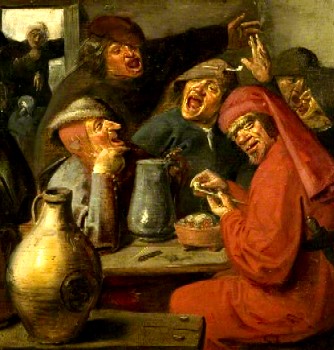
"Master of the Large Jars, Peasants Carousing" (c. 1635)
crew, who "spent their Christmas ashore, drinking and carousing as long as they had any Liquor left"19. In a similar fashion, Edward England's crew spent a Christmas "in Carowzing and Forgetfulness, and kept it for three Days in a wanton and riotous Way"20. To round this trio of celebratory pirate Yuletides out, pirate captains John (Richard) Taylor and Jaspar Seagar celebrated a Christmas where "they caroused, and kept their Christmas in a most riotous manner, destroying most of the fresh provisions they had aboard, of which quite two-thirds was wasted."21 Although none of these accounts mention the specific alcohols involved, they all suggest that it was not only present, it was part of the reason they wasted a lot of their other precious provisions.
Like Teonge's navymen, there were some shipboard celebrations which mention alcoholic libation. After Howell Davis managed to secure a ship to pirate with, "a Counsel of War was called over a large Bowl of Punch, at which it was proposed to choose a Commander"22. (Davis was, not surprisingly, chosen.) Festivities also followed a captain's election, at least among Nathaniel North's crew. Charles Johnson described the post-election celebration. "The Guns are then fired round, Shot and all; he [the new captain] is saluted with three Chears; the Ceremony is ended with an Invitation from the Captain to such as he thinks fit to dine with him, and a large Bowl of Punch is ordered to every Mess."23 In a similar fashion, although for an entirely different purpose, while Bartholomew Robert's crew was preparing a court to judge a man suspected of plotting against the crew, "a large Bowl of Rum Punch was made, and placed upon the Table, the Pipes and Tobacco being ready, the judicial Proceedings began"24.
Perhaps one of the best celebrations of pirate life depicted comes from the memoirs of French Père Jean-Baptiste Labat written while he resided in Martinique. Ever the jolly padre, Labat gives a sparkling and vivid account of something he calls a cochon boucan - a buccaneer's holiday involving a boucained (barbequed) pig - which he assembled for one of his
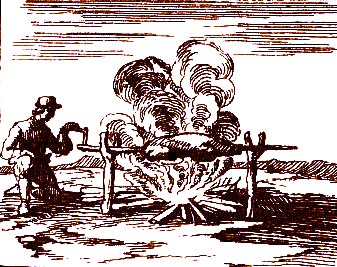
Boucaining a Pig, from On the Spanish Main
by John Masefield (Original Image: 1744)
fellow priests in 1698. This absolutely wonderful account is given in full on this page of the website, so we will only consider the alcohol highlights here.
Labat explains that once the pig is being cooked, the attendees are "permitted to drink a shot (un coup) of wine, provided that they drank it in a coüi (calabash) without water, for buccaneers never pour water into their wine and drink either pure water or neat liquor."25 (This is not entirely true, at least for English pirates and buccaneers, as the notable popularity of punch at sea during the period attests.) Labat had earlier noted that "wine to be cooled in the river" was "the most important [meal ingredient] of all"26. After breakfast, Labat says the men go out to hunt for more food. Experienced hunters who spotted something, but missed hitting it, "were punished on the spot by having to drink as many 'shots', one after the other, as the most successful hunter had brought in birds. The only mercy that can be shown them, if it is proved that bad fortune and not carelessness has been the cause of their crime, is to give them the choice of the liquor that they have to drink."27
Labat finishes his discussion of drinking during this celebration noting:
I do not think it necessary to inform the reader that one of the essential things in a boucan is to drink frequently. The law compels it, the [spicy] sauce invites one to do so, and few err in this respect. But since man is frail and would often fail had he no one to remind him of his duty and correct him, the master of the boucan has to watch his party. Should he find anyone idle or negligent he must at once call everybody's attention to the fact. The delinquent must then do penance by drinking a large coüi, a no mean punishment since the coüi is always kept full of wine.28
It is safe to say that a boucan celebration with Pere Labat would be a memorable experience... well, depending on how much wine you drank, of course.
1 The term appears to have been well known in British society by this time as Prior uses it in an off-hand manner to indicate his despair: "In vain I trusted, that the flowing bowl/ Would banish sorrow, and enlarge the soul.”, Matthew Prior, “The Argument”, The Poetical Works of Matthew Prior, 1880, p. 125; 2 David Wondrich, Punch, 2010, p. xxi; 3 Woodes Rogers, A Cruising Voyage Round the World, 1712, p. 106; 4 Rogers, p. 359; 5 Henry Teonge, The Diary of Henry Teonge, Chaplain on Board H.M.’s Ships Assistance, Bristol, and Royal Oak, 1675-1679, 1825, p. 96; 6 Teonge, p. 187; 7 Teonge, p. 238; 8,9 Teonge, p. 188; 10 Teonge, p. 261; 11 Teonge, p. 270; 12 Teonge, p. 271; 13 Teonge, p. 292; 14 Teonge, p. 235; 15 Teonge, p. 303; 16 Teonge, p. 304; 17 Teonge, p. 4; 18 Teonge, p. 28; 19 Daniel Defoe (Captain Charles Johnson), A General History of the Pyrates, Manuel Schonhorn, ed., 1999, p. 148; 20 Daniel Defoe (Captain Charles Johnson), p. 129; 21 Ed Fox, “56. Richard Lazenby, a prisoner of John Taylor, from The Narrative of Richard Lazenby", Pirates in Their Own Words, 2014, p. 284; 22 Daniel Defoe (Captain Charles Johnson), p. 167; 23 Daniel Defoe (Captain Charles Johnson), p. 524-5; 24 Daniel Defoe (Captain Charles Johnson), p. 222; 25 Père Jean-Baptiste Labat, The Memoirs of Pére Labat 1693-1705, translated and edited by John Eaden, p. 54; 26 Labat, p. 52; 27 Labat, p. 55; 28 Labat, p. 56-7
Alcohol and Sailors: Drinking Healths
Drinking people's health was a popular reason for drinking, although it often appears to have been more of an excuse than a true reason. While in Alicante, Spain, navy clerk John Balthorpe explains that when they sailors drink in the taverns, "To drink apace, we do begin;/ Some Healths to this friend, some to that"1. Such phrasing does not suggest much rigid purpose behind the drinking of healths.
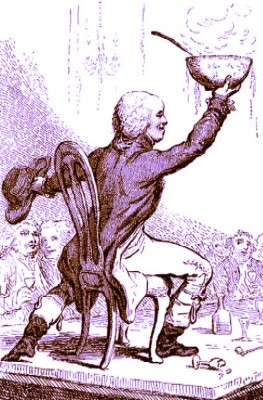
Saluting With Punch, (Captain Morris), From
Florinzel's Follies, By John Ashton (1899)
The basic rules of the game is to drink a glass of alcohol to the health of whomever is named. It was the precursor to what we today call a toast. Like a toast, a health could be drunk to anyone, anywhere, present or not. In his journal, sailor Edward Barlow mentions "drinking healths to our friends in England, hoping ere long to arrive safe there" using sherry.2 Chaplain Henry Teonge mentions navy ship officers drinking a variety of healths in his diary, primarily using punch, although a couple times employing wine. These instances include drinking the healths four times of absent friends3, three times to their wives4 and once to Saint George.5
Sometimes a health was more intimate than that. Captured ship captain George Roberts explains that pirate commander Edward Low had a bowl of punch made "then he took the Bowl and drank to me in Punch"6. In similar fashion, William Snelgrave reported that pirate captain Jeremiah Cocklyn drank his health even recording the substance of the speech for posterity: "I would not be cast down at my Misfortune, for one of the Boat's Crew who had taken us had told him, My Ship's Company in general spoke well of me; and they had Goods enough left in the Ships the had to make a Man of me [make him whole]."7
At times, celebrations were the impetus for drinking healths. On New Year's day, Woodes Rogers crew "drank our Owners and Friends Healths in Great Britain, to a happy new Year, a good Voyage, and a safe Return."8 On Samhain (November 1st), Teonge says that the officers on the Bristol "begin Chrismas, drinking health to our friends in a bottle of punch."9 (The mention of a bottle here is quite interesting given that nearly every other account has the punch served in a bowl.) Sometimes the celebration wasn't even a formal holiday, Pirate captain Francis Spriggs celebrated the taking of a ship and signing of her Mate "in boysterous Mirth, roaring and drinking of Healths"10.
Other times there was no reason given for drinking healths, although gunfire was used to punctuate it. When men from Aleppo (in modern Syria) came aboard the HMS Martin, Teonge noted that they feasted and were "entertayned with abundance of gunns at the drinking of healths."11 (Presumably they drank to each other along with the usual healths, but the details weren't given. Nor do they seem to have been important.) Barlow records a meeting of the merchant ship fflorentine's master with local town merchants in Bergen, Norway where "they had a very good dinner, and drinking several healths, they were very merry and drunk so long that they were almost fuddled, for we fired near a hundred guns that day."12 Arranging a dinner with the local agents of the Royal African Company in one of the gardens at Cape Corso Castle, Captain Thomas Phillips notes that he and Captain Shurley of a consort ship each had "six of our quarter-deck guns brought ashore, with powder &c. and our gunners to ply them; which they did to purpose, and made them roar merrily, firing eleven [guns] at every health."13
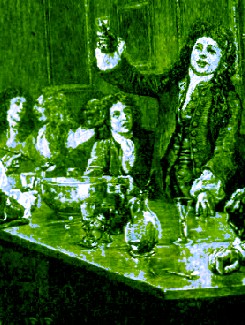
Artist: Charles Green
Offering a Toast, From The Graphic (1884)
More formal reasons also precipitated the drinking of healths. On a mission to procure slaves, Captain Phillips met the king of a tribe of natives near the Dutch Fort in Accra, Ghana who "drank to us his brother the king of England’s health, the African company’s, our welcome, &c. in brandy, and pitto"14 He explained that pitto was a fermented corn alcohol which Phillips said "drinks much like new ale."15 When Phillips' ship Hannibal was at the Whydaw Kingdom in West Africa, the local agents of his company "order’d a hogshead of brandy to be set on end without the castle, and the head knock’d out, for all the army to drink the African company’s healths."16
The pirates also had more formal reasons for drinking healths. After dinner on Edward Low's ship, George Roberts reported that the crew put out a bowl of punch and six bottles of Claret wine "and drank Success to their Undertaking; which went round, I not daring to refuse it. Next Health was Prosperity to trade, meaning their own Trade."17 On another occasion Low asked his men, "‘How goes the great Game?’ to which they answered ‘Well,’ after which salutation all set to for a carouse, passing the glass and drinking each other's health in bumpers of brandy."18 When the alleged pirate hunter William Kidd encountered Robert Culliford's pirates in Madagascar, Culliford was understandably suspicious of him. "Kid soon dissipated their Doubts, by swearing he had no such Design, and that he was now in every Respect their Brother, and just as bad as they; and calling for a Cup of Bomboo [distilled sugar cane made into a sort of punch], drank their Captain’s Health."19
There was also another, political side to drinking healths, but that is extensive enough to require its own section.
3 John Baltharpe, The straights voyage, or, St. Davids poem, 1671, p. 53; 3 Edward Barlow, Barlow’s Journal of his Life at Sea in King’s Ships, East and West Indiamen & Other Merchantman From 1659 to 1703, p. 172; 3 Henry Teonge, The Diary of Henry Teonge, Chaplain on Board H.M.’s Ships Assistance, Bristol, and Royal Oak, 1675-1679, 1825, pp. 12, 43, 61 & 188; 4 Teonge, pp. 21, 26 & 133; 5 Teonge, p. 133; 6 George Roberts, The four years voyages of Capt. George Roberts, 1726, p. 58; 7 Captain William Snelgrave, A New Account of Some Parts of Guinea and the Slave Trade, 1734, p. 216; 8 Woodes Rogers, A Cruising Voyage Round the World, 1712, p. 106; 9 Teonge, p. 261; 10 Daniel Defoe (Captain Charles Johnson), A General History of the Pyrates, Manuel Schonhorn, ed., 1999, p. 353; 11 Teonge, p. 187; 12 Barlow, p. 236; 13 Thomas Phillips, 'A Journal of a Voyage Made in the Hannibal', A Collection of Voyages and Travels, Vol. VI, Awnsham Churchill. ed., p. 205; 14,15 Phillips, p. 217; 16 Phillips, p. 225; 17 George Roberts, p. 72; 18 Charles Grey, Pirates of the Eastern Seas (1618-1723), 1933, p. 120; 19 Defoe (Captain Charles Johnson), p. 447
Alcohol and Sailors: Drinking Healths - Political Underpinnings
The political side of drinking toasts began long before the golden age of piracy and can best be defined in England by the difference between the two primary English political parties of the 17th and 18th centuries: the Whigs and the Tories.
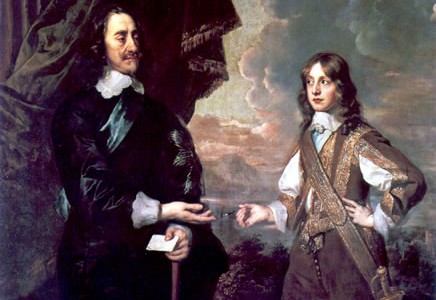
Artist: Peter Lely - English King Charles I and Prince James, Future King James II (1647)
To understand the reasons underlying political toasts, the Stuart monarchy must be understood.
The Catholic-Stuart monarchy began under James I in 1603. While the Tories were (more or less) in favor of the Catholic-Stuart Court, the Whigs were opposed to it. This rivalry came to a head when Parliament executed James' successor, Charles I in 1649.
His wife Henrietta had taken their son Charles Stuart to France the year before where he was raised Catholic. When Charles II learned his father was dead, he declared himself King of England, a role he was not actually able to actually assume until the monarchy was restored in 1660. He ruled until his death in 1685.
Upon his death, Charles was replaced by his brother James Francis Edward, who was made King James II of England. The Catholic King James II's rule collapsed in late 1688 when Protestant William of Orange invaded England with Whig and some Tory support. James fled to Catholic France with his wife and son, essentially abdicating the throne. King William III and James' Protestant daughter Mary II were crowned co-monarchs of England in 1690, ruling until the death of William in 1702. (Mary preceded him in death.) The crown was then taken by the daughter of James II, Anglican Anne Stuart in 1702 (under whom England and Ireland joined, forming Great Britain in 1707). Queen Anne was succeeded by her second cousin, George Lewis, who was crowned King George I upon her death in 1714.
The real story lies in the 'abdication' of James. He came back to England in 1690 in an attempt to re-take the throne, but was defeated by William of Orange's forces in the Battle of Boyne. He returned to France and established a court with the help of French King
Louis XIV. He claimed to be the rightful King, but the English people who supported the Protestant arms of the Stuarts called him "the Pretender
". A movement driven primarily by the Tories to restore the Catholic line of Kings began
![Jacobite Uprising of 1715]](images/Jacobite_Uprising_James_Stuart_Landing_at_Peterhead_Scotland_in_1715jpg.jpg)
Jacobite Uprising of 1715; James Stuart Landing at Peterhead, Scotland in 1715 (1745-6)
upon his abdication and continued through the golden age of piracy into the mid 18th century. Such supporters were called Jacobites, in reference to the Latin 'Jacobi' for 'James'.
James II died in 1701 and was followed by his son, James Francis Edward Stuart, who also claimed to be the rightful King of England. His followers called him James III, while those supporting the Protestant line of Stuarts called him "the Pretender" as they had his father. James Stuart attempted to resume the monarchy in an uprising in 1715 which had some success in Scotland, but was defeated in England at the Battle of Preston. James returned to France.
A great deal could be said about the political motivations and intrigues of Tory and Whig parties, but there has already been far too much serious history and more would go far beyond the scope of an article on the history of alcohols during this period. James Nicholls sums up the relevant points of both the beverage and political preferences of the two parties as they existed in the later-half of the seventeenth century:
The political symbolism of Tory wine and Whig beer was relatively straightforward. For the Tories, wine stood for sophistication, conviviality, wit and good taste. It also stood for loyalty to the crown – a residual effect of the Royalist pledging during the Interregnum [the eleven year suspension of the monarchy which occurred when Parliament executed King Charles and his wife and son remained in France]. For Whigs, wine stood for snobbishness, continental effeteness and, most damningly, a suspiciously Catholic-looking Francophilia. On the other side, Whigs depicted beer as honest, hearty, unpretentious and, crucially, English; the Tories depicted Whig beer drinkers as tedious, miserable and even violent in their cups.1
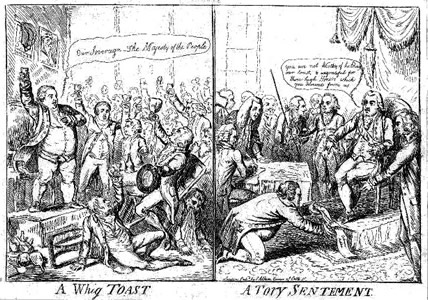
Attributed to: Isaac Cruikshank
A Whig Toast. A Tory Sentement, Courtesy of the British Museum (1795)
Nicholls also points out that since wine had to be imported, it was more expensive, making it more a drink of the elite such as the Royalist Tories tended to be. Beer, ale and cider, on the other hand, were made in England and were free from import fees, making it more accessible to the common men like the Whigs. Wine, being the drink of the English court, "represented both stability and sophistication; ale and beer, by contrast, seemed to stand for a provincial dullness which had erupted into horrifying Puritan enthusiasm."2
Although this decisive 'drink as a political statement' may seem a bit surprising, although it really should not be. As Nicholls suggests, "As long as people drank, and as long as what they drank said something about who they were, then the rituals which accompanied social drinking would take on political significance."3
This brings us to drinking healths, or what we would call toasts. One of the signs of support for the deposed monarch during the Interregnum was to drink the health of Charles lI. "By drinking healths to the exiled King, Royalists not only kept his cause alive, but constantly reminded themselves what the Royalist cause stood for: the restitution of that aristocratic hegemony so rudely and violently interrupted by Cromwell and his henchmen."4 As wonderful as this may have sounded to the Royalists, it was primarily an empty gesture,
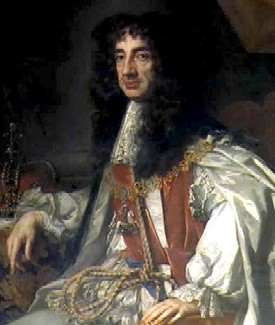
Artist: Peter Lely - English King James II (c. 1675)
something even Charles II recognized. Within days of his Restoration to the throne, he issued "A PROCLAMATION against vicious, debauched, and prophane Persons. By the KING." on May 29, 1660. It said that there were a
sort of men, of whom we have heard much, and are sufficiently ashamed, who spend their time in taverns, tipling-houses, and debauches, giving no other evidence of their affections to us but in drinking our health, and inveighing against all others who are not of their own dissolute temper, and who, in truth, have more discredited our cause by the license of their manners and lives, than they could ever advance it by their affection or courage. We hope that this extraordinary way of delivering use from all we feared... will work upon the hearts even of those men to that degree that they will renounce all that licentiousness, profaneness, and impiety with which they have been corrupted, and attempt to corrupt others, and that they will hereafter become examples of sobriety and virtue, and make it appear that what is past was rather a vice of the time than of the persons, and so the fitter to be forgotten together.5
Such was not to be the case. Once Charles died and his son fled to France, the Tories who turned to Jacobitism resumed the practice of drinking the health of the deposed King as a way to express solidarity and support. "Not all Tories were Jacobites, but intermittently the Jacobite cause enjoyed Tory support when political or religious issues came to a head and large numbers of party members allied themselves with the Jacobites in opposition to the Whigs and the Hanoverian monarchy [George I began the Hanoverian monarchy in 1714]."6
Which finally brings us back to the topic at hand. Several accounts attest to the use of Jacobite toasts among some of the pirates. Captain James Killing testified at pirate captain Stede Bonnet's trial that before unloading the cargo they wanted from Peter Mainwareing's sloop, 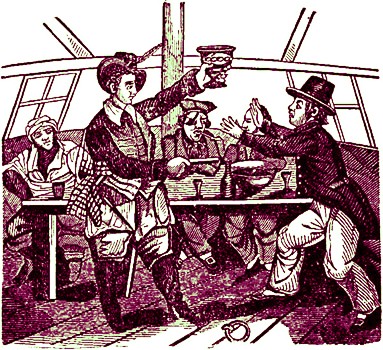
A Really Odd Rendering of Edward Low Forcing a Captive to Drink
Punch, From The Pirate's Own Book (1837)
they first took pineapples, rum and sugar and "made Bowls of Punch, and went to Drinking of the Pretender’s Health, and hoped to see him King of the English Nation"7. Captured merchant captain William Snelgrave reported that Jeremiah Cocklyn "drank several ...Healths, amongst which was that of the Pretender, by the name of King James the Third, and thereby I found they were doubly on the side of the Gallows, both as Traitors and Pirates."8 However, the most striking account of drinking of James Stewart's health by the pirates comes from George Roberts' book.
As mentioned previously, Roberts was a captive of Edward Low's pirates. He inadvertently made a bitter enemy of John Russell, the captain of Low's companion schooner, by refusing to join the pirates and serve as their navigator. Russell managed to get Roberts onto his ship one evening where they drank a series of healths in large glasses of punch. They drank a couple of healths before Roberts found himself in trouble. What happened is best explained by Roberts himself:
The third Health was, The King of France: After which, Russel began the King of England's Health; so they all drank round, some saying, The King of England’s Health, others only The aforefaid Health, 'till it came round to me... So I took the Glass, ...said, Gentlemen, here is the aforesaid Health. What Health is that, said Russel? Why, says I, the same Health you all have drank, The King of England's Health. Why, says Russel, who is King of England? I answer' d, In my Opinion, he that wears the Crown, is certainly King while he keeps it. Well, says he, and pray Who is that! Why, says I, King George at present wears it. Hereupon he broke out in the most outrageous Fury, damning me, and calling me Rascally Son of a B- ; and abusing his Majesty in such a virulent Manner, as is not fit to be repeated, asserting, with bitter Curses, that we had no King.
I said, I admir'd that he would begin and drink a Health to a Person who was not in being. Upon
which, he whipp'd one of his Pistols from his Sash, and I really believe would have shot me dead, if the Gunner of the Scooner had not snatch'd it out of his Hand.9
As enticing as this account sounds as an example of fierce Jacobite loyalty, however, Low himself later told Roberts, "The Health was not the Cause, but rather the Effect of his Anger, and a meer Pretence to cloak his Resentment for other Disappointments"10, the primary one being that Roberts had managed to go against Russell's desire to have him serve their crew as a navigator.
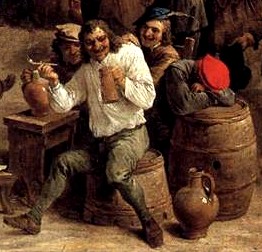
Artist: David Teniers the Younger
Peasants Merrymaking (1650)
Using the drinking of healths to James Stewart as proof that the pirates were Jacobites is fraught with difficulty. In the first place, drinking a health is hardly a serious commitment to the cause, especially when doing so among a group of peers who are not likely to care very seriously about it... unless it suits their ulterior motives as it did Russell's. In the second place, all these accounts of Jacobite toasts come from victims of the pirates. As Ed Fox asks, "How many witnesses felt the need to 'frame-up' additional charges against the pirates who had captured them, and how many were genuinely reporting their experiences remains to be seen."11
This is not to dismiss pirates from having Jacobite ties. Some of the pirates clearly had such sympathies, given their ships' Jacobite names and the connections some of them had to Jacobite leaders. Dr. Fox suggests that they even used the failed 1715 uprising as a recruitment tool to bring disaffected sailors into their fold.12 However, the drinking of healths is hardly damning evidence. Those interested in a more in-depth examination of Jacobite-pirate connection are directed to Dr. Fox's article.
With the Jacobites and dissenting Tories toasting James Stewart, it should not be surprising to learn that the other side was toasting the crowned king. This came to be known as "the loyal toast", a term that may have had its origins either in the crowning of William and Mary or of King George I.13
As recorded in the section on celebrations, naval Chaplain Henry Teonge recorded a celebration
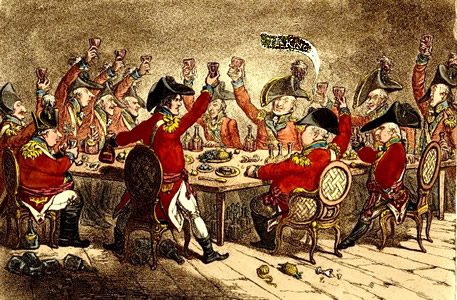
Artist: James Gilray
Loyal souls, or a Peep into the Mess Room at St. James, British Museum (1797)
of King Charles' birthday and Restoration (to the throne) day of May 29th three times; first in 1675 with sherry, then in 1676 with wine and finally in 1678 with ale, beer and punch.14 Charles actually died before the celebration of any of these birthdays; it is possible that the men on Teonge's ship Assistance didn't find out until later due to the slowness with which news traveled, but the last celebration must have been in reference to the King's Restoration, which seems like a direct shot at the Commonwealth. Teonge elsewhere mentions drinking the health of the king two other times, the first simply noted that they had done so, while the second "conclude[d] the day and weeke in drinking to the Kinge, and all that wee love; while the wind blowes fayre."15
This tradition wasn't limited to navy men. When merchant captain Thomas Phillips was at Cape Corso Castle in what is now Ghana, Africa, he noted that the chief of the castle would drink the health of the ships, the men and their owners, but only "after drinking the king's health in a bowl of punch"16. Not all pirates were supporters of James Stewart either. Richard Hawkins, a forced man aboard Francis Spriggs' ship, said, "whether they were drunk or sober, I never heard them drink any other Health than King George’s."17 In fact, when Spriggs' crew mistakenly heard that George I had died, they lowered their flag to half mast and plunged right in and drank to the health of George II!18
1 James Nicholls, The Politics of Alcohol, 2009, p. 29; 2 Nicholls, p. 26; 3 Nicholls, p. 28; 4 Nicholls, p. 27;5 Quoted in Lord Somers, A Third Collection of Scarce and Valuable Tracts on the Most Interesting and Entertaining Subjects, Vol. II, 1751, p. 325-6; 6 E.T. Fox, "Jacobitism and the 'Golden Age' of Piracy, 1715-1725", International Journal of Maritime History, XXII, No. 2 (December 2010), p. 278; 7 The Tryals of Major Stede Bonnet, 1719, p. 13; 8 Captain William Snelgrave, A New Account of Some Parts of Guinea and the Slave Trade, 1734, p. 216-7; 9 George Roberts, The four years voyages of Capt. George Roberts, 1726, p. 72-3; 10 Roberts, p. 82; 11 See Fox, "Jacobitism and the 'Golden Age' of Piracy", pp. 289; 12 See Fox, "Jacobitism and the 'Golden Age' of Piracy", pp. 284-91; 13 "Notes and queries", The Guardian, gathered from the web 1/7/18; 14 Henry Teonge, The Diary of Henry Teonge, Chaplain on Board H.M.’s Ships Assistance, Bristol, and Royal Oak, 1675-1679, 1825, p. 96, 187 & 238; 15 Teonge, p. 21 & 28, 16 Thomas Phillips, 'A Journal of a Voyage Made in the Hannibal', A Collection of Voyages and Travels, Vol. VI, Awnsham Churchill. ed., p. 204; 17 Ed Fox, “59. Richard Hawkins' account of his capture by Francis Spriggs, from The British Journal, 8 August, 1724 and 22 August, 1724", Pirates in Their Own Words, 2014, p. 301; 18 Daniel Defoe (Captain Charles Johnson), A General History of the Pyrates, Manuel Schonhorn, ed., 1999, p. 353

